2009.10.20[Event Reports]
Panorama of Egyptian Cinema – Symposium in session! The screening of Winds of Asia – Middle East: Hassan and Morkos + Bitter Right.
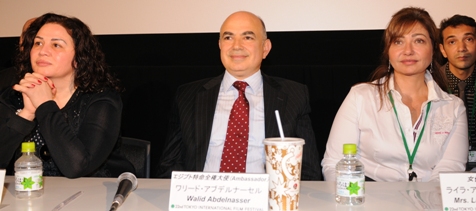
“Winds of Asia – Middle East showcase the excellent films of Asia and Middle East with a slogan, “More extensively! More profoundly!” As one of the special feature to fulfill the slogan, we launched the symposium, “Panorama of Egyptian Cinema, featuring Egypt, which boasts 100 years of history as a major film making nation in the Middle East”, with our co-organizer: Embassy of the Arab Republic of Egypt in Japan. The movie marathon of the late master film maker, Youssef Chahine’s four part Alexandria series, will be screened along with the films made by the young directors who were influenced by Chahine, and are leading the next generation of Egyptian Cinema. The screening will be held everyday with the luxurious guests from the respective films.
The comedy, Hassan and Morkos, starring Omar Sharif, was screened on Oct. 18th. The respective families of Christianity and Islam religious leaders go into hiding, as a follower of the different religion to avoid the danger. Hassan and Morkos is a social film which depicts the religious conflict which besets Egypt and attempts to seek the way to resolve the problem by showing the humorous religious gaps between the two religions symbolically. Bitter Right which is shown together with Hassan and Morkos is a short documentary film which made a powerful appeal to the audience by issuing the problem that the divorced women in today’s Egypt face.

The symposium started following the screening of the film by the seven members, namely, Ambassador Dr. Walid Abdelnasser, the Egyptian ambassador to Japan, and the film director, actress and media officials who held the symposium.
The Egyptian Film Production information was given as follows. "The only country in the Arabian world which has a successful ‘film industry’ is Egypt, which boasts 100 years of film making history. The Egyptian film has been considered as one of the Egypt’s export item and is fully supported by the government,"mentioned Ambassador Walid. "The number of the films produced by the government supported funds reached the total of 100 films. The three of the film titles produced the government have been shown at the Venice Film Festivals, competition screenings, and I think our film industry is reviving,"mentioned Mrs. Amal Amin Osman, Editor-in-Chief, Akhbar Elnogoum Magazine. The two actresses who are Egyptian superstars, Mrs. Laila Ahmed Eloui and Mrs. Elham Ahmed Shahin who is also a Producer, talked about the genres of the Egyptian cinemas, such as musicals, comedies, dramas, tragedies and varieties and mentioned, “The national identity of Egyptian people are known to be cheerful. We think positively and over come the problems even when we are facing the trouble. The movie is very appropriate for a better understanding between the two parties. We would like the film festival audiences to get this feeling by watching our films,"mentioned Mrs. Laila Ahmed Eloui.

"I am proud of being the disciple of the director, Youssef Chahine," said Khalid Youssef, the Director of the Justified Betrayal. “ I was surprised that it wasn’t only in Egypt but also in Japan that the U.S. films boasted the overwhelming distribution share. The countries like Japan and Egypt with long history should work together and break the Statue of Liberty.” Director Khakid Youssef shared his spirited feelings about breaking through the film industry which is led by the U.S. films humorously.

Finally, Ambassador Dr. Walid Abdelnasser showed his enthusiasm by mentioning, "The propositions are made to the Japanese film companies regarding to the use of film locations in Egypt. Like the Egyptian and Japanese cooperation of the book publishing industry which has already begun; we would definitely like to set up the cooperation between the Egyptian and Japanese film industry as well. ” The symposium lasted beyond an hour but the participating audiences gave a big applause in the end.
As some of the participants of the symposium mentioned, watching the movies gives us the good opportunity to understand the different cultures. We recommend you to visit our Film Festival and get in touch with the films from different cultures.

2009.10.20[Special Contents]
Master of Italian Cinema, Giuseppe Tornatore appears on stage! – TIFF Daily News #9

TIFF Daily News delivers the concise version of full film festival day.
● Master of Italian Cinema, Giuseppe Tornatore appears on the stage for Q&A which allows the guest to talk directly with filmmakers.
● TIFF movie café: Competition Press Conference in progress!
● TIFF park: Kinoshita presents Woodwork Class
2009.10.20[Special Contents]
Green Carpet: The colorful scene in which Prime Minister Hatoyama has walked. – TIFF Daily News #8 –

TIFF Daily News delivers the concise version of full film festival day.
● Green Carpet: The colorful scene in which Prime Minister Hatoyama has walked.
● Stage Appearance and Greetings: Special Screening section titles – Oceans & AVATAR Special Presentation.
● [MARC JACOBS x TIFF night]: Tadanobu Asano’s DJ performance!
2009.10.20[Event Reports]
Oct. 18th (Sun), Kinoshita presents Woodwork Class at TIFFpark
Many families gathered at the TIFFpark where the Green Carpet was rolled.

Executive Managing Director, Takenobu Nishio greets the guest in the beginning.
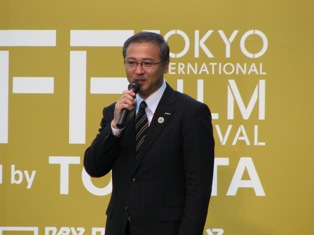
Following the greeting, the grand total of 70 Kinoshita Meister Club’s carpenters filled the stage! They appear to be tough looking men but they say they are nice Meister at heart who helped the participants do their woodwork.
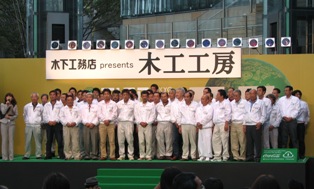
Before the woodwork, plasterers made their exhibition on the stage and held a class on diatomite plastering on the wall.

The participants of the class were struggling mightily saying “I can’t scoop the plasters properly with the plaster too” or “I’m not sure if I’ve done it right”. We are pleased to send our compliments to the plasterers, who showed their brilliant craftsmanship at the event.
The woodwork class began following the plastering class. The class was divided into Handprint Corner which decorated the handprints with small pebbles made of glass and the woodwork corner. Father, Mother and their children practiced the craft.



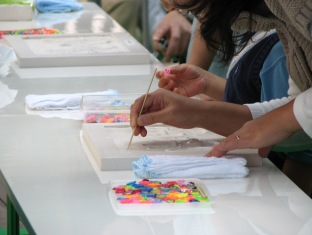
The children were enjoying, sitting happily on the chair that they have made by themselves or decorating the handprints on the diatomite plasters with letters and small glass pebbles. Children’s father were teaching their children but were also engaged enthusiastically with craft. The mothers looked impressive with their crafts. It turned out to be an event which children and their parents never became tired of.

The participants brought their handmade crafts back to their home after the class. It was a nice sunny day and we were glad that the participants experienced “ecology” which is the theme of the film festival.
2009.10.20[Event Reports]
Competition section, Southern District: Oct. 18th, Q & A Report
The Director of the film, Juan Carlos Valdivia and a leading actress, Ninón del Castilio; Director of Photography, Paul de Lumen and the production designer, Joaquín Sánchez and the Producer, Gabriela Maire, all appeared for Q&A session after the screening.
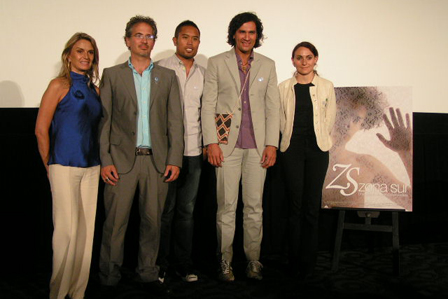
Appearing on the photo from the left, Ms. Ninón del Castilio, Director Juan Carlos Valdivia, Paul de Lumen, Joaquín Sánchez and Gabriela Maire.
The Director, Juan Carlos Valdivia, gives a greeting first. “Thank you for visiting us. This is the first time for us to participate in the film festival like this one. I have a great interest in how people in Japan, who live in the other side of the earth, respond to our film. We are very pleased to be able to be here today.
※ The following Q & A contains elements that refer to the story and the ending of the film.
Q In this film, the house itself seems to be the central character of the film. How did you discover that wonderful mise en scene, the house in your film?
Juan Carlos Valdivia: You are right. The house has a role as a character in this film. It was the Production Director, Joaquín who made the preparations. The every details in this house represents something.
Ninón del Castilio: I knew the people who lived in this house. I use go to the party in this house.

Q: This was the first Bolivian film entry for our film festival. I was attracted to the scenery, music, and the clothes that the native South American wore. I am not so familiar with the Bolivian society but I would like to know if there are racial and class discriminations?
Juan Carlos Valdivia: Bolivia is a country with diverse cultures. As you have seen in the movie, people actually speak the indigenous language of the South American natives. But nowadays, the indigenous people are starting to gain power in our society and things are beginning to change. However, in this film, there are various cultures existing inside the house and that’s not about the discrimination between Caucasians or Negroes. There are various elements that co-exist here. In the film, there’s a little son who lives in the house. This small boy spends a long time with the native servants and learns the native culture from them. I believe that the house represents the current Bolivia like a cloth that weaves the culture.”
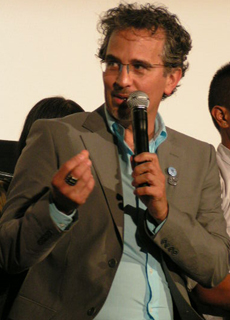
Q: In the end of the film, an intelligent mother finally sells the house. What inspired you to sell the house in the end of the film?
Juan Carlos Valdivia: Selling the house is very much like forfeiting everything you have. The lifestyle is revolving around the house. The house is a symbol of class in the society.
But the real situation that the family in the film is facing is that they no longer couldn’t pay the wages to the servants, and had no money to even purchase the bread. The situation has reversed and now they need to borrow the money from their servants because they have spent all their money by living so unrealistically. And in the end, the buyer of the house was an indigenous person who have risen to the new class and gained power and wealth.
Q: How do the people of the new class become wealthy?
Juan Carlos Valdivia: I can say that it’s a political change. There was an election held recently and the indigenous native person was chosen as the president. Until recently, people of our country have been leading a very old lifestyle and we are finally catching up with the modern times. Until now, there were much injustice done and the gaps are spreading between the rich and the poor class. We are depicting the people who have lost their privileges in the country in this film.
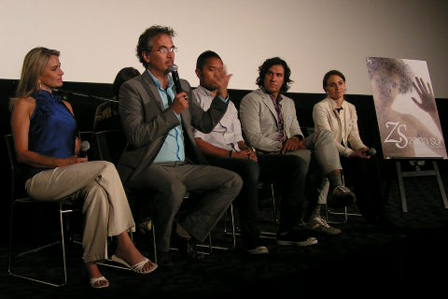
2009.10.20[Event Reports]
Winds of Asia – Middle East section, Chengdu, I Love You: Oct. 18th, Q & A Report
This film was developed as one of the reconstruction support project for Great Sichuan Earth Quake. The film takes place in Chengdu, the capital of Sichuan Province. The film develops in two different periods, 1976 and 2029. Fruit Chan directed part of 1976.
Firstly, Chen Weiming who picked up the microphone gave his comment, “We haven’t depicted the ‘earth quake’ itself because we didn’t want the people of Sichuan Province who were the victims of the earthquake to recall the painful incident. We wanted to depict the bonding of peoples’ hearts to give them strength to live.

After Chen Weming’s comment, Director Fruit Chan said, “When the ‘Great Sichuan Earth Quake’ took place, I was in America, but the details of the disaster damage was reported on the news immediately. While watching the news, I re-acknowledged that the best media to present the tragedy of the earth quake was the news media. But I felt strongly that if I were to shoot the film with Sichuan Earth Quake as a theme, I would take a totally different approach.
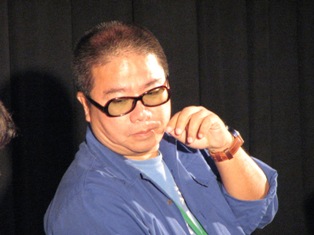
When an audience asked, “What was the reason for appointing Cui Jian as another Director for the second part of the film?” Chen Weiming replied, “When we made Devils on Doorstep with Director Jian Wen, we had a plan to ask Cui Jian to do the music but unfortunately this didn’t happen. This was in my conscience for a long time and when I heard that Cui Jian wanted to shoot the film as a director, I offered this film to him. As you know, Cui Jian is a very talented musician and I was anticipating for his artistic sense as a film Director to bloom. Producer Chen Weiming explained contentedly.
2009.10.20[Event Reports]
Competition section: Snowfall in Taipei - Director and casts appeared together at the press conference.

The film was written by a Japanese screenplay writer and was made into film by Huo Jianqi, the director of Postmen in the Mountains. The film, Snowfall in Taipei takes place in Taiwan. It is a love story which depicts about two young people who leads a beautiful and heartrending life.
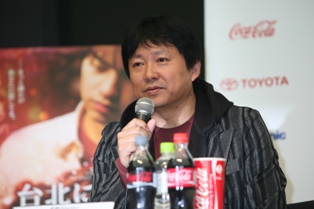
“I was very impressed when I read the screenplay and thought that I wanted to express it as a film. We shot the whole section of this film in Taiwan. The staff and casts all spoke the same language, Chinese. We ate the same food too. There really wasn’t any difference compared to making the film at China. The cast and staff got along perfectly and we were able to shoot the film smoothly with extremely good team work,” Director, Huo Jianqi, explained his feelings about the film.
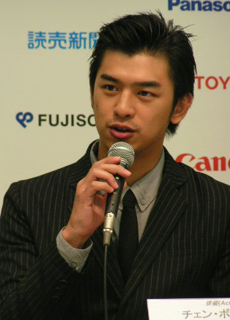
The leading actor, Chen Bolin praised the Director Huo Jianqi by saying, “He was the kindest Director amongst all the Directors that I have worked in the past. He never raised his voice even once to the end of the production. Even when a staff made a mistake, he would say “No problem lets try it again”. I have a feeling that the character Mo that I acted in the film is actually the Director himself when he was still young.”(Saying this with a laugh)

Next in line was Tanya. The direction that the Director gave to her was “Not to act”. “The character of May that I acted was a singer who made a sudden disappearance; I tried to create a unique characteristic in my own way and approached the film shooting. But when the production began, Director told me, “Try to be more natural. I like it better when you are the way you are because it’s realistic and that is what moves the people”. That is why rather than acting the role I’ve developed, I tried to draw out the parts inside me that were more like my true self and made the performance. It’s not so long ago that I made my debut but I was able to work with a wonderful Director and I would like to work with him again.”

Yang Yuning acted a role of a music producer who May, performed by Tanya, secretly admires. ”He is perfect in terms of music business, but his actual personality is somber and sluggish. I’m usually a lively type of person in real life that is why it was kind of difficult for me to play the part. For creating this role, I’ve tried to stay away as far as possible from rest of the cast. Even when the rest of the cast was having a cheerful conversation, I tried not to blend in with them. When the film shooting was completed; we all went out for a drink. That was when something inside that I kept holding finally exploded and I was able to exhale and become myself.”

Morning Mo played the part of an entertainment reporter, Jack. “The Entertainment reporters and actors have a very delicate relationship in Taiwan. I asked what kind of feelings he had when he was pursuing the scandal, to my friend who works as a reporter. He replied that he was interested in covering quality news rather than following his feelings. But he also told me that he had some conflict with what he did sometimes. His advice became a good reference for developing my character.”
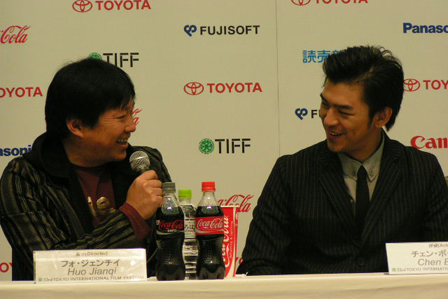
The Director said, “I was looking at and treating the cast as if I was their parents but, there were some things that I needed them to do as a film Director. For example, there’s a scene in the film where Chen Bolin does a red pepper eating race. I shot the scene in full shot and then in close shot, and he had to eat the red pepper over and over again. I was sorry for Chen Bolin who was attached to me like my son.”

Finally the MC asked Chen Bolin to give a PR speech in Japanese. He spoke in a fluent Japanese saying “I feel shy because everybody else has spoken in Mandarin, but I would like everybody to come and see the Snowfall in Taipei!”

2009.10.18[Event Information]
Oct. 18th (Sun) – Roppongi Hills Arena / TIFFpark
14:00 – 16:00 (Admission starts 13:00)
Kinoshita will present Kinoshita Carpentry Workshop
Free of admission
Workshop will admit first 200 groups of children in elementary school and younger with their parents.
17:30 -18:30
TIFF CINEMA Jockey
“Yuji YAMAMOTO”
Free of admission
This is the presentation of the event, CINEMA Jockey, which enlivened the TIFFpark and TIFF movie cafe at the 21st TIFF last year. TIFF CINEMA Jockey performed by Yuji YAMAMOTO, who made his base as sports DJ with fusion of music and talk, currently plays a successive role as DJ for the motion picture score music.

2009.10.18[Updates]
Message from Sebastián Cordero, Director of Rabia(Competition Section)

Oct. 18th (Sun) 21:30 (Door opens at 21:00)
Oct. 22 (Thur) 17:50 (Door opens at 17:30)
Ticket:
Oct. 18th (Sun) Walk-up tickets available at t-pia (Purchse procedures in Japanese only)
Oct. 22 (Thur) Walk-up tickets available at t-pia or at l-ticke.com (Purchse procedures in Japanese only)
Director’s Message:
After having killed a man, José María chooses to hide inside a mansion and becomes invisible in order to remain close to the person he loves. Without anyone knowing he is there, he becomes a ghost-like voyeur and a witness to what is happening in the house. Half-heard conversations; dramatic moments interrupted by the risk of being discovered; characters partially glimpsed from the shadows: José María’s day-to-day life is marginal. He is like a wild animal: afraid of being discovered, and afraid of what he himself might discover about Rosa, the woman he loves, who works and lives in the mansion, so close to him yet unreachable.
José María leads an invisible and lonely life, and like many Latin American immigrants in Spain, his only comfort comes from the hope of a reconnection with his loved ones. It doesn’t matter that he and Rosa have only recently met: when he finds a second phone line and contacts her again, his discovery fuels the hope for a reunion one day. José María calls Rosa in a continuous shot that connects them for the first time in weeks, starting with him dialing then travelling through the house towards a ringing phone in the living room below. The smooth, ominous steadycam movements enhance our feeling that he is becoming the eyes and ears of this mansion, sharing a space with Rosa without being able to touch her.
Aesthetically, the film goes from a relatively “conventional” visual narrative to some very extreme and stylized moments, which reflect the changes and decay inside José María, as his isolation wears him down. His conversations with Rosa become the heart of their “long-distance” relationship, as months pass.
While they fantasize about a life together, the decadent mansion only reflects the remains of what are now extinct moments of happiness. Most of the memories there have been stored in the attic where José María hides, and they feed his dream of one day having a family. Ironically, the Torres and their children epitomize the decay of relationships, and of love: this is a family that has lost the capacity to stay together, except through self-interest or fear of loneliness.
The “rage” in RABIA alludes to José María’s growing fury at being denied something basic: respect, love, a family. He rebels by hiding, becoming invisible. José María thinks this is his only option, but his situation is contradictory and hopeless, because ultimately he doesn’t want to disappear.
Sebastián Cordero

→ Read more
2009.10.18[Special Contents]
Green Carpet Highlight: AVATAR - Sam Worthington & Sigourney Weaver
















